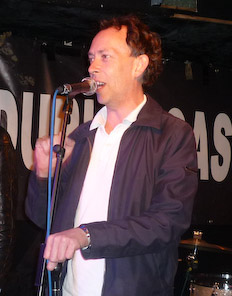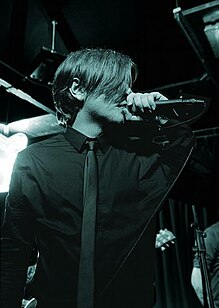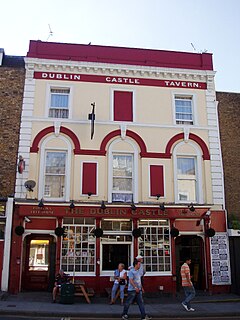Britpop is a mid-1990s British-based music and culture movement that emphasised Britishness. It produced brighter, catchier alternative rock, partly in reaction to the popularity of the darker lyrical themes of the US-led grunge music and to the UK's own shoegaze music scene. The movement brought British alternative rock into the mainstream and formed the backbone of a larger British popular cultural movement, Cool Britannia, which evoked the Swinging Sixties and the British guitar pop of that decade.

Blur are an English rock band. Formed in London in 1988, the group consists of singer Damon Albarn, guitarist Graham Coxon, bassist Alex James and drummer Dave Rowntree. Blur's debut album Leisure (1991) incorporated the sounds of Madchester and shoegazing. Following a stylistic change influenced by English guitar pop groups such as the Kinks, the Beatles and XTC, Blur released Modern Life Is Rubbish (1993), Parklife (1994) and The Great Escape (1995). As a result, the band helped to popularise the Britpop genre and achieved mass popularity in the UK, aided by a chart battle with rival band Oasis in 1995 dubbed "The Battle of Britpop".

Stephen Paul Lamacq, sometimes known by his nickname Lammo, is an English disc jockey, currently working with the BBC radio station BBC Radio 6 Music.

Parklife is the third studio album by the English rock band Blur, released on 25 April 1994 on Food Records. After disappointing sales for their previous album Modern Life Is Rubbish (1993), Parklife returned Blur to prominence in the UK, helped by its four hit singles: "Girls & Boys", "End of a Century", "Parklife" and "To the End".

The Great Escape is the fourth studio album by the English rock band Blur. It was released on 11 September 1995 on Food and Virgin Records. The album reached number one on the UK Albums Chart and charted in the top 10 in more than ten countries around the world. Less than a year after the album was released, it was certified triple platinum in the UK. The album received near-universal acclaim on release.
Sleeper are an English rock band formed in London in 1992. The group had eight UK Top 40 hit singles and three UK Top 10 albums during the 1990s. Their music was also featured in the soundtrack of the pop cultural hit movie Trainspotting. The band split up in 1998, but reunited in 2017.

"Country House" is a song by English alternative rock band Blur. It was released as the lead single from the band's fourth studio album The Great Escape on 14 August 1995. Released on the same day as the Oasis single "Roll with It" – in a chart battle dubbed the "Battle of Britpop" – "Country House" reached number one in the UK Singles Chart. The song is the band's best-selling single, with over 540,000 copies sold as of May 2014.

"Common People" is a song by English alternative rock band Pulp, released in May 1995 as the lead single off their fifth studio album Different Class. It reached No. 2 in the UK Singles Chart, becoming a defining track of the Britpop movement as well as Pulp's signature song in the process. In 2014, BBC Radio 6 Music listeners voted it their favourite Britpop song in an online poll. In a 2015 Rolling Stone readers' poll it was voted the greatest Britpop song.

Menswear were a Britpop band formed in October 1994 from Camden in London. They released a number of singles and an album, Nuisance, on the short-lived London Records subsidiary Laurel. A second album followed, which was released only in Japan; the group broke up in 1998. Menswear, made up of a new line-up in addition to frontman Johnny Dean, played their first show in 15 years in August 2013.
Romantic Modernism, more commonly known as Romo, was a musical and nightclubbing movement, of glam/style pop lineage, in the UK circa 1995–1997, centred on the twin homes of Camden-based clubnight Club Skinny and its West End clone Arcadia, as well as concerts by the chief associated bands.

The Marquee Club was a music venue first located at 165 Oxford Street in London, when it opened in 1958 with a range of jazz and skiffle acts. Its most famous period was from 1964 to 1988 at 90 Wardour Street in Soho, and it finally closed when at 105 Charing Cross Road in 1996, though the name has been revived unsuccessfully three times in the 21st century. It was always a small and relatively cheap club, located in the heart of the music industry in London's West End, and used to launch the careers of generations of rock acts.
Popscene was a UK "indie dance" club of the 1990 Brit Pop movement..
Perfume were a British indie group from Leicester, active between 1993 and 1997.
60 Ft. Dolls were a Welsh rock trio active in the 1990s, known as the Cool Cymru era.
Gary Crowley is an English broadcaster, TV presenter and DJ.
Silvery are a London-based 4-piece indie rock band, signed to Blow Up Records. Their sound was described by journalist David Quantick in The Word as "Splenetic, frenetic, kinetic" and in NME as "Girlie harmonies, sniggering, fairground piano... tumble-dried Blur melting Sparks into liquid pop".

The PRS for MusicHeritage Award is a ceremonial plaque installed in a public place to commemorate a link between a famous musician or music band and the location they performed their first live gig. The UK-wide plaque is awarded and funded by PRS for Music.

The Dublin Castle is a pub and live music venue in Camden Town, London. It was built for Irish navvies working on railways in London, but gained prominence as a venue in the late 1970s after the band Madness established a live reputation there. Subsequently, it was an important venue in the early stages of several bands' careers and contributed to the Britpop musical genre. Amy Winehouse was a regular visitor to the pub.
Camden Crawl was a music festival in Camden, London, which first appeared in 1995 and then was held annually from 2005 to 2014.

Jane Savidge is a British writer and public relations agent.











